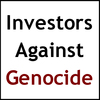JPMorgan Issues Proxy Statement Opposing Genocide-Free Investing Proposal
Says it "considers human rights" yet invests in companies tied to genocide
Published 04-11-12
Submitted by Investors Against Genocide
Despite the fact that JPMorgan Chase owns over a billion dollars worth of PetroChina, a company widely recognized as contributing to the genocide in Sudan, the company stated in the proxy statement it issued late last week that it opposes a shareholder proposal asking the company to avoid companies tied to genocide. According to JPMorgan Chase’s statement of opposition, "Our business practices reflect our support and respect for the protection of fundamental human rights and the prevention of crimes against humanity." Yet the company’s statement offers no explanation for its ongoing investments in PetroChina.
JPMorgan Chase (NYSE:JPM) is one of the largest U.S. holders of PetroChina (NYSE:PTR) that through its closely related parent, China National Petroleum Company, is helping to fund the government of Sudan's campaign of violence. Nearly half a million people in the South Kordofan and Blue Nile regions of Sudan currently are facing relentless aerial attacks, violent displacement, and starvation due to the Sudanese government’s ongoing military assaults. Ongoing government-sponsored genocide in Sudan has spanned more than two decades and resulted in the death of over 2.5 million innocent civilians. Millions more have been displaced and currently live in deplorable and insecure conditions.
“If their business practices reflect support for human rights, then why do they continue to own and buy more shares of foreign oil companies tied to genocide,” asks Eric Cohen, chairperson of Investors Against Genocide, the non-profit organization that coordinated the shareholder proposal. “Since this proposal was on the ballot at JPMorgan Chase last year, the company has had ample opportunity to take steps to become genocide-free,” says Cohen. “Instead they have increased their shares of PetroChina.”
“The vast majority of Americans want their investments to be genocide-free,” says Cohen. According to a market research study conducted by KRC Research in 2010, 88% of Americans would like their mutual funds to be genocide-free.
In preparation for the vote at JPMorgan Chase, Investors Against Genocide has begun an innovative campaign of outreach to the largest and most influential segment of voters – institutional investors. IAG’s “genocide-free investing” shareholder proposal will be on the ballot at JPMorgan Chase for its second year. Since 74% of shares of JPMorgan Chase are held by institutions, rather than by individual shareholders, IAG is seeking to engage influential voters ranging from asset managers to pension funds via direct mail, advertising and trade conferences.
Institutions voting for the genocide-free proposal at JPMorgan Chase last year included AFSCME Employees Pension Plan, Bridgeway Funds, Calvert Investments, Christian Brothers Investment Services, Connecticut Retirement Plans and Trust Funds, Consulting Group Capital Markets Funds, Domini Social Investment Trust, Epiphany Funds, Green Century Funds, New York City Pension Funds, OneAmerica Funds, Parnassus Investments, Professionally Managed Portfolios, Schroder Global Series Trust, Trillium Asset Management, T. Rowe Price, Turner Funds, and Trust for Professional Managers. This year, IAG hopes to raise that number by direct engagement with investors in advance of the vote.
The genocide-free investing shareholder proposal requests “that the board institute transparent procedures to avoid holding investments in companies that, in management's judgment, substantially contribute to genocide or crimes against humanity, the most egregious violations of human rights.” The genocide-free investing proposal was submitted to JPMorgan Chase as part of an ongoing shareholder action led by Investors Against Genocide, a citizen-led initiative, dedicated to convincing mutual funds and other investment firms to make an ongoing commitment to genocide-free investing.
IAG withdrew its shareholder proposal at TIAA-CREF when it adopted a public policy against investments tied to genocide. TIAA-CREF subsequently divested holdings in oil companies that are helping to support the genocide in Darfur, Sudan. American Funds divested its holdings in PetroChina following a well-publicized shareholder vote on genocide-free investing there.
Investors Against Genocide, a citizen-led initiative, dedicated to convincing mutual funds and other investment firms to make an ongoing commitment to genocide-free investing. Investors Against Genocide works with individuals, financial firms, pension and endowment managers and government officials to encourage investment firms to change their investing strategy to avoid investments in companies that substantially contribute to genocide or crimes against humanity. Investors Against Genocide is staffed by volunteers and is a project of the Massachusetts Coalition to Save Darfur Inc., a 501(c)(3) non-profit charitable organization, incorporated in the state of Massachusetts. For more information, visit www.investorsagainstgenocide.org.

Investors Against Genocide
Investors Against Genocide
Investors Against Genocide is a non-profit organization dedicated to convincing mutual fund and other investment firms to change their investing strategy so as to avoid complicity in genocide. In particular, we want investment firms to avoid or divest holdings of PetroChina (Chinese), Sinopec (Chinese), ONGC (Indian), and Petronas (Malaysian), the four major oil companies that are partnering with the Government of Sudan and helping to fund the genocide in Darfur. The campaign works with individuals, companies, organizations, financial institutions, the press, investment firm employees, and government agencies to build awareness and to create financial, public relations, and regulatory pressure for investment firms to change. The ultimate goals are that investment firms adopt at least the most basic ethical investment policies, that the Government of Sudan ends its deadly genocide in Darfur, and investment firms avoid investing in genocide in the future.
More from Investors Against Genocide

